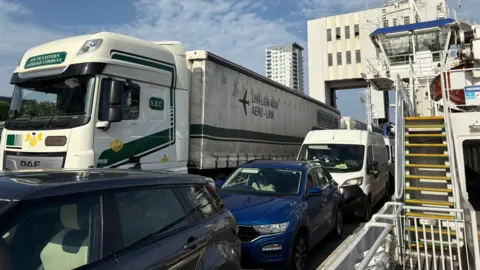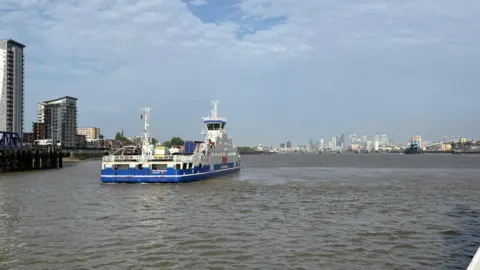Drivers turn to ferry to avoid new tunnel tolls
 Cameron Blackshaw
Cameron BlackshawHundreds of drivers are using a free ferry to cross the River Thames instead of using two tunnels which now have tolls.
As a result, drivers have described lengthy queues and a surge in the number of lorries using the Woolwich Ferry after tolls began on 7 April for the Silvertown and Blackwall tunnels.
Commuters have said although the ferry is like a "cargo ship" as lorries use a lot of space, it was still preferable to the "too high" £8 daily tunnel toll.
Transport for London (TfL) has said it is monitoring the situation closely. Its figures show an additional 1,800 vehicles use the boat-based crossing every day since tolls came in. The Mayor of London has been asked for comment.
The combined Silvertown and Blackwall corridor averages 88,000 vehicles across both directions on a typical weekday, TfL added.
This is a reduction from the 90,000 to 100,000 vehicles that were using the Blackwall Tunnel on an average day before the Silvertown opening, the Local Democracy Reporting Service said.
Motorists are charged to use either the Blackwall or Silvertown tunnels. The peak charge for cars is £4 for one trip.
Residents living in 12 east London boroughs - Barking & Dagenham, Bexley, Bromley, Greenwich, Hackney, Havering, Lewisham, Newham, Redbridge, Southwark, Tower Hamlets, Waltham Forest - and the City of London, and drivers on certain benefits may be eligible for a 50% discount on the tunnels charge.
Around 3,500 residents are currently registered for this discount.
Businesses, sole traders and charities registered and operating from Greenwich, Newham or Tower Hamlets are also eligible for a £1 discount on the off-peak charge.
 Cameron Blackshaw
Cameron BlackshawLetisha Hyde, who lives in Thamesmead, used to regularly use the ferry to get to work and get her children to school and nursery. Now she chooses to use the tunnels because of how busy the ferry has become.
She said: "I was expecting the ferry to be a lot busier since the tunnel charges and it definitely is. However, there is always a two boat service, which runs until later now.
"Congestion at peak times wouldn't be as bad if the lorries weren't taking up so much space - it's like a cargo ship at times.
"Since the tunnel the amount of lorries in the morning has tripled and one lorry alone takes up three to four cars on the ferry."
Having to use the tunnel has "put a lot of pressure" on Ms Hyde's finances.
She said: "Eight pounds a day adds up and I've had to budget elsewhere to make sure I'm able to afford essentials. The extra petrol I'm having to use also has been a strain."
Woolwich resident Dev Der uses the ferry to get to his office in Canary Wharf and said he would continue to do so because he felt the £8 daily toll on both tunnels was "too high".
Greenwich resident Loong Chung said: "I use [the ferry] when the queue isn't too bad and I am willing to queue if it's less than 30 minutes' wait.
"Eight pounds for a return trip is just too much. If I'm not in a rush, I will try to use the ferry or the Rotherhithe Tunnel."
Tony Silver, also from Greenwich, said using the Blackwall Tunnel was now "a pleasure" with less traffic.
It would take an act of parliament for TfL to charge ferry users, as the service has been free since 1889.
Andy Lord, TfL commissioner, said: "Our staff are working hard to manage the additional customers and keep the ferry on schedule, and we are monitoring this situation closely with the expectation it will settle in the coming months as new travel patterns are established."
A TfL spokesperson said that the zero emission bus services using the two tunnels, which have been made free for at least the first year of the Silvertown tunnel's operation, had seen a 160% increase in usage.
"This is alongside improved reliability on the Route 108, which saw a 23% drop in average wait time in April 2025 compared with the same period last year," they added.
Listen to the best of BBC Radio London on Sounds and follow BBC London on Facebook, X and Instagram. Send your story ideas to [email protected]
